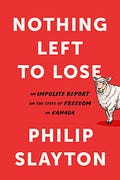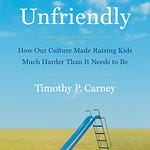How free is Canada as a country? That’s a question that my guest on the podcast today tackled in a book back in 2020 — concluding that our freedom was actually pretty precarious.
Philip Slayton is a Canadian lawyer and a former dean of law at Western University. He’s also a former president of PEN Canada, and a bestselling author. His latest book had a huge impact on me. It’s called Nothing Left to Lose: An Impolite Report on the State of Freedom in Canada.
Philip joins me for a lively state of the nation conversation, looking at how the pandemic, economic inequality, and the use of the Emergencies Act to quash the trucker protests has impacted freedom in this country.
TH: Philip, welcome to Lean Out.
PS: Well, thank you. I’m happy to be here. It’s nice to see you.
TH: Nice to see you as well. I’ve just re-read your book, and there’s so many interesting threads to pull. To start, I want to go through how you’ve defined the necessary list of conditions for freedom. It’s a long list. So I’ll just touch on a few: An alert and skeptical citizenry, willing to challenge authority; an appropriate apportionment of power between executive and legislative branches of government; a vigorous independent, diverse, and discipline press; a strong and independent education system; an effective justice system available to all; a rejection of political correctness. This book was written before the pandemic. You concluded freedom was precarious at that time. What is your assessment now, several years later?
PS: Let me just begin by saying, as the points you read out suggest, my view of freedom is that it’s a very complex idea with many moving parts. It’s not susceptible to easy treatment, or the shouting of slogans. It’s complicated and needs to be seen as such. Okay, so, what’s happened since the pandemic? Well, I have mixed feelings. Initially, I was quite disturbed by what I thought was the heavy-handed approach of government to dealing with this. I wrote an op-ed piece in The Globe and Mail, maybe in June of 2020, saying, “I don’t like walking through the park and not being able to sit on a park bench. And I don’t like walking around and seeing a sign that says you may be asked for your identity credentials at any time.” This rubbed me the wrong way.
But, on the other hand, there’s no question that it was a very serious public health crisis, very unusual. It needed unusual, and perhaps what in another context would be regarded as draconian, restrictions. That’s not a very satisfactory answer, I know. I don’t have a clear conclusion. I didn’t see anything in the pandemic that made me feel our freedoms were safe, that freedom was expanding. I did see things which suggested to me the opposite. But I think the opposite was, to some degree, justified by the circumstances.
TH: We can talk more about that. I think probably there’s some points of disagreement there between you and I. But before we go any further, one thing I want to get out of the way. You are a former president of PEN Canada. We have American listeners on this podcast. Canada has “freedom of expression.” Can you give us a brief explainer of what that means legally?
PS: Freedom of expression? Well, again, it’s a complicated concept. I’m sorry to keep saying that, but it’s true. I’m something of a freedom of speech absolutist, a freedom of expression absolutist. I think there should be very few restrictions on freedom of expression — freedom of speech being only one, but an important aspect, of freedom of expression. On the whole, in this country, from a legal point of view, from a government authority point of view, there are not many restrictions, I’m glad to say. Although I detect a worrying trend away from that laissez faire attitude on the part of government, and regulatory bodies, and the law in general. We seem to be moving in the wrong direction. But, generally speaking, freedom of expression means freedom to do, to write, to paint, to act, to say, pretty much with very few restrictions, whatever you want.
Now having said that, Tara, let me come back to the idea of freedom being a complicated idea. Let’s take writing. For example, we can proclaim that people are free to write whatever they want. But if you look at the reality behind that, you see something of a different picture. You see, for example, that you’re free to write whatever book you want, but you can make no money virtually doing that … The reality is although you’re free to write, you can’t afford to do it.
TH: That makes a lot of sense. Since we’re on the topic of writing, you write in the book about CanLit — about our literary culture, and how bitterly divided it is over things like the Steven Galloway case and the cultural appropriation debates. Talk to me about what you’ve seen evolve in our writing culture.
PS: The first thing to say about the writing culture is that it’s small. There are not many people who write, and there are not many people who read. I mean, there are some dramatic exceptions to this, of course. The Margaret Atwoods, the Michael Ondaatjes. But they are very few and far between, and their influence is very unusual. Generally speaking, the writing culture in this country is moribund. Again, an example of what I just said. People are free to write whatever they want pretty much, as they should be. But there are very few people doing it in any kind of effective way that reaches a mass audience. So the writing culture, there’s a problem with it.
Now, within the writing culture — as I write in the book, as you mentioned — there’s been tremendous divisions, tremendous controversy, and a lot of bitterness and serious unpleasantness, which is unfortunate.
TH: On a related note, there’s the education system, particularly post-secondary, which you write about in the book too. We recently saw a professor at UBC law, Stéphane Sérafin, write about his experiences trying to teach property law and particularly aboriginal law in the context of this, I don’t what else to call it, “woke” ideology. It has resulted in a formal human rights complaint. This is someone, it’s worth pointing out, who spent years working in First Nations communities before going to law school and has a great appreciation and respect for Indigenous traditions. You write in your Collegeland chapter about this ideological movement on campuses, and its potential to shut down free speech and open debate. Walk me through the broad strokes of your argument there.
PS: I find the prevalence of ideology on university campuses — it’s not just Canada, of course, it is many countries, and it’s throughout the university, virtually all faculties, including law faculties, as you mentioned — I find that to be extraordinarily dangerous, extraordinarily retrogressive. And, personally, an anathema to what I believe in. I’m old school on this, and not just on this, but just about everything. I think that the university is a place for free expression. Where anybody should be able, within very few limits, to argue whatever kind of argument they want to make. And it’s a place where arguments need to be tested objectively, according to their soundness — the soundness of the argument, the soundness of the facts they refer to, and so on.
All of that is distorted by the intrusion of ideology. And it’s an intrusion of ideology which is often thoughtless, knee-jerk, riding whatever happens to be the current political currents. It’s depriving people at universities, students at universities, of the true basis of an education. As I say in the book, the most essential thing that an education does is teach you — and this is not original to me — how to distinguish a good argument from a bad argument. There are so many bad arguments floating around, people who trying to get you to buy into things, to subscribe to things, to do things when there’s really no sound basis for doing it. You need to be able to identify those bad arguments. You need to be able to test them. You need to be able to spot them so that you can reject them. And that, to me, whatever else the universities do, is the essence of their mission. And of course the intrusion of ideology, whatever it happens to be, distorts, or indeed even destroys, the ability to perform that mission.
TH: What do you think is to be done about that in universities?
PS: Oh my God. Well, it’s prevalent in this country, in the United Kingdom, the United States, France and elsewhere. What’s to be done? I really don’t know. I despair when I contemplate this. I had a discussion about this fairly recently with a very distinguished Canadian writer. I was expressing my feeling that the world is spiralling out of control. She gave me a kind look, she smiled, and she said, “Don’t worry, Philip, the pendulum will eventually swing in the other direction.” Maybe it will, maybe it won’t. I hope she’s right. But as to what’s to be done? I think all you can do, certainly at the individual level, is fight it in any way you can. Criticize it in any way you can. Speak out, or write about it, in any way you can.
Of course, you will then suffer quite possibly bad consequences for doing that. Because you will be contrary to the prevalent accepted ideology. What amazes me though, Tara, is how quickly and easily senior university administrators and professors bought into this. These are people who are well-educated, who were thoughtful, and in many cases have had quite a long career in the academy, have seen other times and other ways of doing things. And yet they seem to have embraced all of this wholeheartedly. I don’t understand why. Are they afraid? I just don’t understand.
TH: I think that the way that it’s been framed is quite powerful. It’s framed that to be against this ideology is to be against equality. And nobody wants to be against that!
PS: No. But again, I would come back with you to first principles. I mean, nobody is in favor of inequality. Nobody that I know, anyway. And indeed, I write about this my book. I write about the very adverse effects of income and wealth inequality. People don’t talk about that so much, but I think it’s absolutely central. No one’s in favour of inequality. Everybody is in favour of equality. But you have to say to yourself: What is equality? What does that mean? What are the components of it? What are the most important parts of that? And how do we specifically address those things? You have to do that rather than spouting slogans.
TH: The income inequality piece, I was so glad you wrote about that. We will return to that. But I want to talk for a moment about Covid. You talk about the press quite extensively in the book. During Covid, I saw very little questioning, for example, of public health authorities, from members of the press. My view is public health officials are human beings, like anyone else. Some will be mistaken about some things. Some will be in conflict of interest. Some will be overwhelmed and exhausted. Some might be corrupt. We actually saw a public apology from a Danish newspaper for not being more skeptical. I want to read something from the late David Carr of The New York Times, which you quoted in the book, talking about the attitude of the British press: “The one question all of the young reporters on Fleet Street are taught to keep foremost in their minds when interviewing public figures can best be paraphrased by, ‘Why is this jerk lying to me?’” How do you think our national press handled the pandemic?
PS: The first question is: What is the national press? Because the national press is a different animal than it was 20 years ago, before social media basically took over. How did they handle it? I would say not well. I’m not sure this is because the national press — to the extent there is a national press — is inept, corrupt, or whatever. I think it’s more that they’re in disarray, and they don’t have the resources that they need to thoroughly and doggedly pursue and expose the truth. Very few newspapers do have that. Almost none. The New York times, for example, would be an exception, and there’s perhaps others. But very few do. So I don’t think they handled it well.
I also think — and this is a theme of my book, as you know — in Canada, every citizen, everybody is much too reticent to question what officials say. We’re much too deferential. We accept what figures of authorities say, we accept what senior government officials say, including public health regulators. We accept what judges say. We don’t challenge. We don’t question. We don’t argue. And that, I think, is one of the ways in which our freedom is corroded.
Every citizen needs to be asking themselves: Why are they saying this to me? Why are they promoting this particular idea? Are they right to do so? Then you get into the good argument, bad argument thing. Are they giving me good arguments that I should accept, or not?
But we are not inclined to do that in the way people in some other countries are. Now, again, it’s a complicated issue, because then people would say, “If you challenge authority too much, if you reject authority too much, eventually you get some kind of collapse of your institutions.” That is to some extent true. But it’s like everything else; it’s where you find the middle ground.
TH: Let’s talk about vaccine mandates for a moment. I consider those an infringement on freedom. I think the rational argument behind them has fallen apart. In fact, we saw it in The Globe and Mail, Zain Chagla from McMaster University, an infectious diseases specialist, saying exactly that. We know that the vaccines don’t stop transmission. We know that they don’t stop infection. And his point, especially with travel, is that those under 12 have always been involved in travel. So there’s never been a purely vaccinated space anyways. What’s your thinking on the vaccine mandates?
PS: When you say vaccine mandates, you mean the requirement that you be “ fully vaccinated” before you can do certain things, travel internationally, go into restaurants, that sort of thing. Well, you know, this is kind of unsatisfactory too, I’m sure, but I don’t really know. I do accept what people say, medical scientists say, which is that vaccine has prevented a far greater pandemic and tragedy than has in fact happened. I accept that. Scientists, people that know far better than I, tell me this, that the vaccine is a wonderful and effective thing, although not completely effective. I also agree with what you say, what other people say, which is that Covid is a very complicated disease. It’s hard to beat and keeps popping up in different guises, despite the vaccine.
Okay, but try and address your point directly. I think you and I have to differ on this. I think on the whole, vaccine mandates as a public health measure are probably defensible, even though I accept — and I’m sure you believe this — I accept that they represent considerable intrusion on our personal freedom. Because we’re being told to do something and if we don’t do it, then we are deprived of all kinds of opportunities and facilities that we want.
TH: I think that if it was a different vaccine and a different virus, I may feel differently about it. But the logical thinking through of it is difficult at this point because of the transmission issue, mainly, but also because of the small threat of myocarditis in certain populations — perhaps some people should be able to make a meaningful choice of which risk they would prefer to take. And that not being able to travel, not being able to participate in social spaces, that seems to me a very coercive measure.
PS: Well, yeah, I mean it’s disingenuous to say to somebody, “You don’t have to do this if you don’t want to.” Because if you don’t do it, you’ll be, as I said, deprived of all kinds of opportunities and facilities that you don’t want to be deprived of, that you accept as normal. So it’s a heavy-handed approach. But I would say to you, Tara, what’s the alternative? Is the alternative to just let people do whatever they want and accept what might be very adverse public health consequences?
Although this does bring me back to what, in a sense, is my central point in all of this, which is you need to explain to people, you need to lay out the facts to them. You shouldn’t say, “You must have a vaccine, just go and get it. Don’t ask too many questions.” You have to explain why they should have a vaccine. What the advantages are of a vaccine and what the disadvantages are of not having a vaccine. And then let them decide for themselves.
Now, that may be a very high bar to attain because it implies a massive, coordinated, rational, public education process — telling people why they should do this in some detail, rather than forcing them to do it. But the direction that most countries, including our country, went was essentially forcing people to do it. And then you get back to my point about the deferential Canadian. If some head of a Science Table — I don’t know what a Science Table is exactly, but whatever it is — if the head of a Science Table says, “You should do this” or “ You must do this,” well, he’s head of a Science Table, right? So he must be right. That’s the way many Canadians think now. However, you are now going say to me, “Not every Canadian thinks that way. Look at the Freedom Convoy.”
TH: Yes.
PS: And where does that fit into the equation?
TH: Exactly. I definitely wanted to speak about that as well. You write in the book about the level of power that the executive branch of government has in Canada. We saw Justin Trudeau exercise that power when he evoked the Emergencies Act to quash those protests, and also then making it a confidence vote in parliament as well. The Canadians Civil Liberties Association launched legal action. RoseAnne Archibald, national chief of The Assembly of First Nations, has warned the House of Commons Finance committee that it sets a bad precedent. She worries that those same powers could be used to freeze the bank accounts of anyone supporting any blockade. So far, Ottawa is citing cabinet confidentiality. We don’t know the full justification. This inquiry that’s happening may shed more light. But given that it’s run by someone who used to work for the Liberals, we may be a bit skeptical. What do you make of all that?
PS: I think the invocation of the Emergencies Act was a very serious mistake. I mean, I know nothing other than what I read in the newspapers, so I have no special knowledge of this. But from what I know, and what I see, I judge it to have been a very serious mistake. Totally out of all proportion to the threat that was posed. You can, in a democratic country like ours, cite cabinet confidentiality to obscure the reasons why you did it. I think that’s the last refuge of the scoundrel, confidentiality.
I think it was a very serious mistake. Far too broad in its application. What essentially you were confronted with, it seems to me, in Ottawa — now, Windsor, the borders, were somewhat different — but in Ottawa it was a failure of the local police to deal appropriately and expeditiously and reasonably with what happened. And the emphasis should have been on that and how to fix that. And I guess eventually it was fixed in that way. But the invocation of the Emergencies Act was completely unjustified. You know, it was a pale limitation by the Prime Minister of what his father did in the FLQ crisis. And very pale limitation, too, I say.
So, I’m opposed to it. I agree with the Canadian Civil Liberties Association; I agree with all the criticisms that have been made of this. I think this inquiry, which of course is required under the act, is just silly. It’s not going to tell us anything. I think we perhaps need to revisit that legislation, and either seriously amend it or scrap it all altogether. It has no place in a country like ours.
TH: You also write in the book about secrecy, which I thought was so interesting. I wanted to talk for a moment about internet regulation. Michael Geist recently filed a Freedom of Information Request with the government and gained access to Canadian Heritage’s online harm consultation process in relation to internet regulation. Twitter, for instance, argued that the proactive monitoring of content envisioned by the government sacrifices freedom of expression to the creation of a government-run system of surveillance. The requirement to share information at the request of the Crown is also troubling, it said. And it likened the government’s website blocking plans to policies from countries like China, North Korea and Iran. Andrew Coyne, writing in The Globe and Mail, has said this direct state regulation of content promises to be worse than the disease. Philip, how concerned should we be?
PS: We should be extremely concerned. I agree with what Michael Geist wrote, and I agree with what Andrew Coyne wrote. I read those things because you sent them to me. [Laughs] I agree entirely with both of them. The idea that government should have any part at all in regulating social media content is appalling to me. Absolutely appalling. I don’t think it’s far-fetched to start talking in the same breath about North Korea or China, or now Russia. It’s not far-fetched at all. Once the government starts, in any way at all, regulating what people can see, scrutinizing material — you are in serious trouble. As I said earlier in our conversation, I’m a freedom of speech absolutist. I think that restrictions on freedom of speech need to be very minimal.
One obvious example is incitement to violence. That clearly has to be, and is, in our country, illegal. But save for that, and one or two other similar kinds of examples, there should be pretty much unrestrained freedom of speech.
If somebody posts something that’s absurd, or risible, or prejudiced, then we should be astute enough and well-educated enough — back to my good argument, bad argument theory — to be able to spot it. The average citizen should be able to spot it and say, “That’s ridiculous. I don’t believe it.” Or, “That’s harmful. I reject it.” That’s the appropriate way of dealing with these things. Not to have the government step in, and according to whatever the political ideology of the day is, decide, no, that’s not appropriate for people in this country to see, or to read. Horrible idea. I don’t think it’s going to happen. Because I think, in this country — notwithstanding the fact that we’re all too deferential and passive when it comes to authority — I don’t think Canadians will buy this.
TH: I hope not.
PS: One thing is they might try and close you down. They might decide the ideas you are propagating on Lean Out are not suitable for consumption by the Canadian public.
TH: Indeed.
PS: Against vaccine mandates? No, we have to shut this woman up! [Laughs]
TH: You dedicate a whole section of the book — returning to income inequality now — to how income inequality jeopardizes freedom. Billionaire wealth in this country increased 68 percent during the pandemic. How does economic inequality limit freedom?
PS: I think in many ways, some fairly obvious, some fairly subtle. The aspirations of the middle class, until fairly recently, were regarded as acceptable and appropriate. You know: The cottage with the picket fence so that your children and your dog can play happily in the back; the prospect of a reasonable kind of job with some degree of security; provisions for your old age when you eventually retire. All these things that were normal, acceptable, reasonable aspirations have basically been dashed.
… It’s a malfunctioning of the capitalist system, which is concentrating too much wealth in one place to the detriment of the other. There’s only so much to go around. I also find it, personally, almost obscene the wealth that some people are allowed to accumulate, not because they’ve discovered a cure for cancer or anything hugely dramatic like that. But just because either they’ve been extremely lucky, or they’ve managed to pull the economic levers in some particularly effective and subtle way, often to the detriment of the general wellbeing. So I think these issues have to be addressed …
Everybody talks about other kinds of inequality, and injects theories about it in university courses and in op-eds and so on. But income inequality doesn’t seem to attract that level of attention. But it’s so fundamental to me.
TH: I agree with you completely. I do find it astonishing how little coverage and little discussion and debate it gets, considering the huge impact that it has. I have two last questions for you. You had an academic reader read earlier drafts the book, and they concluded that you are a dominant culture white male, speaking to other dominant culture white males. You reject this premise — this idea that some of us have more legitimacy to participate in the public conversation than others. That was the first time I’d seen that articulated publicly. Why is it important to say?
PS: I reject the idea that we are all entirely trapped by whatever particular circumstances that we find ourselves in. I can’t change the fact that I’m a white man. I can’t change the fact that I had the benefit of a good university education; I’m very grateful that I did. I can’t change the fact that I grew up in a peaceable, prosperous Western society. I can’t change these things. But the idea that somehow this traps me, when it comes to what I can say, what I can think, what I can write? And that somehow everything I say, or think, or write, has to be seen through that prism and discounted accordingly? I reject that. I think that there’s no reason to accept that.
The idea, for example, that I can’t say anything meaningful about the plight of Canadian Indigenous people because I am not that? I reject that. That would be such a complete fetter on all kinds of discussion and discourse. Everything would just grind to a halt if that were to be accepted. So I just reject it. Now, of course, that’s not to entirely to discount the fact that we all, to some extent, are creatures of who we are — and that may influence what we say, and what we write, and what we think. Of course, I recognize that. But other than that, no.
This is all part of what I regard as a grotesque and extremely dangerous identity politics movement, which wants to confine everybody to an increasingly smaller identity silo and reject their legitimacy when it comes to commenting on anything that’s not within their silo. This is contrary at all human progress and thought over millennia. It’s a fairly recent thing and I hope it dies a quick death.
TH: At the end of the book, you offer a Citizen’s Manifesto, a list of actions for Canadians — things like replace deference to establishment institutions and individuals with informed skepticism. When you think about that list, what do you see as the most pressing action for us all to think about?
PS: I don’t think this is on the list as such, but I think the most important thing is for each individual citizen to take responsibility. To accept that they have a responsibility to pay attention, to think, to try and discern the good arguments and weed out the bad ones, to criticize when appropriate, to speak out if necessary, but in a careful, informed and skeptical way.
We haven’t talked about the famous Freedom Convoy. My problem with the Freedom Convoy is, as far as I can tell — I may be wrong on this, but I don’t think so — that that consisted largely of shouting meaningless slogans and the people shouting these meaningless slogans were doing it for who knows what reason, but it didn’t have much to do with political philosophy. You may disagree with me on this; I think perhaps you do.
TH: I think I do.
PS: [Laughs] Yeah, okay. Well, that’s another discussion. But I think each and every citizen, everybody walking down the street out there, has this responsibility to pay attention to what’s going on and not to be afraid to speak out intelligently and skeptically if necessary.
TH: Hear, hear. On the Convoy, I thought Rupa Subramanya’s reporting was incredibly thorough on this point, and that there was a lot of concern about the actual vaccine mandates. And there was a lot of concern about economic inequality within the ranks of that protest. So I would just add that as a last note. Let’s end on this: Where do we go from here? Are you optimistic? Are you pessimistic? What do you think happens next in this country?
PS: Well, that’s a big question, Tara. I wish I could be optimistic, but I don’t feel particularly optimistic. I feel that there’s a lot of negative forces at work and they feed off each other. I’m alarmed in particular about what I see as the increasing disappearance of a true sense of a Canadian identity, that crosses all provinces and territories. I think that’s taken a big beating recently. I think we are all tending to become more and more narrowly defined, which is not a good thing.
In my new book, which will come out next year sometime, I talk about identity politics … We’re all getting more and more narrowly defined, squeezed into our little corners, told in effect to disrespect those who are not in our little enclave. This is very bad and this has to be stopped if possible. But I don’t see how that’s going to happen. So I wish I could be optimistic and cheerful. But hey, I’m a Russian Jew. What do you expect? [Laughs]
This transcript has been edited and condensed.















Nothing Left to Lose